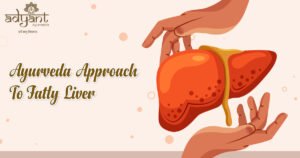
Table of Contents
ToggleIntroduction: The Diabetes Epidemic in India and the Promise of Ayurveda
“Tired of managing diabetes with daily pills and injections? Ayurveda offers a time-tested, natural way to reverse the disease by addressing its root causes — not just the symptoms.” In 2024, India had over 77 million people living with Type 2 Diabetes and another 25 million with prediabetes. With sedentary lifestyles, poor dietary habits, and stress contributing to this metabolic disorder, modern medicine offers only partial solutions. Ayurveda, India’s ancient healing system, provides a root-cause approach to reversing diabetes naturally.
This comprehensive guide explores the Ayurvedic treatment for diabetes, highlighting powerful Panchakarma therapies, real-life success stories, expert-approved herbs, and diet protocols.
For free consultation with top ayurvedic doctors, download our app from Play Store “AyurCare“
What is Diabetes According to Ayurveda?
In Ayurvedic texts, Diabetes is referred to as Madhumeha, a subtype of Prameha. It is caused by the vitiation of Kapha, Pitta, and Vata doshas along with affected tissues (Dushyas) like Meda (fat), Mamsa (muscle), Rasa, Rakta, Shukra, Lasika, and Ojas.
“Madhumeha is a Maharoga, a major disease affecting the entire body.” – Charaka Samhita
Ayurveda identifies two types of diabetes:
- Sahaja Prameha (Genetic/Type 1)
- Apathya Nimittaja Prameha (Lifestyle-induced/Type 2)
You May Also Like: Ayurvedic Treatment for Hypertension or High Blood Pressure
Types of Diabetes
- Type 1 Diabetes: An Autoimmune condition where the immune system destroys insulin-producing beta cells.
- Type 2 Diabetes: The most common form, caused by insulin resistance or inadequate insulin production.
- Gestational Diabetes: Develops during pregnancy, may lead to Type 2 diabetes later.
- MODY (Maturity Onset Diabetes of the Young): A rare genetic form of Type 2 diabetes that typically develops in youth.
- Prediabetes: Blood sugar levels are elevated but not high enough for a Type 2 diagnosis.
Ayurvedic Approach for Each Type of Diabetes
- Type 1: Managed with Rasayana therapies, diet regulation, and Panchakarma as supportive care (Yapya – manageable).
- Type 2: Often reversible with Panchakarma, herbs, and diet changes.
- MODY: Similar to Type 2 management, but adapted for younger age group and long-term metabolic reset.
- Gestational: Managed with safe herbs and strict dietary control.
- Prediabetes: Focus on Agni-deepana (digestive fire strengthening), early Panchakarma, and lifestyle change.
Stages of Ayurvedic Diabetes Care
- Prevention: Nidana Parivarjana (removal of causative factors), adopting a balanced diet and lifestyle
- Early Intervention: Panchakarma (bio-purification), Shamana (palliative care)
- Reversal & Maintenance: Rasayana (rejuvenation), Ojas enhancement, personalized herbal support
Clinical Case Studies: Real Results from Ayurveda
Case 1: Male, 41 years, HbA1C reduced from 14.87% to 6.05% in 8 months (Kottakkal Arya Vaidya Sala, Bengaluru)
Study 2: Female, 23 years, MODY Type, reduced FBS to 79 mg/dl and PPBS to 110 mg/dl without lifelong insulin (Sri Kalabyraveshwara AMC, Bengaluru)
Case 3: HbA1C from 11.2% to 5.7% in 9 months at AyurVAID, Bengaluru (no allopathy used)
Also Read:Ayurvedic Treatment for Cholesterol
Complications of Diabetes
- Cardiovascular disease: Increased risk of heart attacks and stroke
- Neuropathy: Nerve damage causing numbness, pain, or tingling
- Nephropathy: Kidney damage leading to failure or dialysis
- Retinopathy: Eye damage that can lead to blindness
- Foot damage: Ulcers, infections, possibly leading to amputation
- Skin issues: Fungal and bacterial infections
- Hearing loss
- Alzheimer’s disease risk
Ayurvedic Samprapti (Pathogenesis) of Diabetes
- Dosha: Kapha-pradhana Tridosha Dushti
- Dushya: Meda, Mamsa, Rakta, Lasika, Ojas, Shukra
- Srotas: Mutravaha, Medovaha Srotodushti (Sanga + Atipravriti)
- Agni: Jatharagni & Dhatwagni Mandya
- Udbhavasthana: Amashaya
- Adhisthana: Basti
- Roga Marga: Madhyama
The imbalance leads to the formation of Ama (toxins), insulin resistance, and tissue degeneration.
How Panchakarma Helps in Diabetes Management
Panchakarma offers a profound detox and rejuvenation strategy that addresses the root of diabetes:
- Removes toxins (Ama)
- Balances vitiated doshas
- Restores Dhatwagni (tissue metabolism)
- Improves liver and pancreatic function
- Increases insulin receptor sensitivity
- Reduces insulin resistance
These benefits collectively promote long-term glycemic control and prevent complications.
Read Also: Ayurvedic treatment for Hypothyroidism
Panchakarma Therapies for Diabetes
- Udvartana (Herbal Dry Powder Massage): Burns Meda (fat), stimulates lipid metabolism
- Vamana (Therapeutic Emesis): Ideal for Kapha-related diabetes, clears the upper GI tract and mucus
- Virechana (Purgation): Acts on the liver and pancreas, stimulates insulin secretion
- Basti (Medicated Enema): Best for Vata diabetes, improves gut flora and insulin sensitivity
- Snehapana (Internal Oleation): Enhances receptor sensitivity, corrects Agni, and reduces Ama
Read more about Panchakarma Treatment
Best Ayurvedic Medicines for Diabetes (With Dosage)
| Medicine | Type | Dose |
|---|---|---|
| Katakakhadiradi Kashayam | Decoction | 15ml + 15ml water BD |
| Chandraprabha Vati | Tablet | 1 tab BD with kashayam |
| Shiva Gutika | Rasayana | 0.5 tab BD |
| Avipattikara Churna | Powder | 1 tsp after food |
| Mehabhya Kashaya | Decoction | 20 ml TID |
Read More: Ayurvedic Treatment for Weight Loss
Ayurvedic Herbs for Diabetes Management
- Guduchi (Tinospora cordifolia): Enhances immunity and lowers blood sugar
- Bitter Melon (Momordica charantia): Mimics insulin and reduces glucose levels
- Fenugreek (Trigonella foenum-graecum): Improves glucose tolerance
- Gymnema Sylvestre: Reduces sugar cravings, boosts insulin
- Amalaki (Emblica officinalis): Antioxidant, supports the pancreas
- Neem (Azadirachta indica): Detoxifier, lowers glucose
- Vijaysar (Pterocarpus marsupium): Regenerates beta cells
Read also: Ayurvedic medicines for diabetes
Ayurvedic Diet & Lifestyle for Diabetes
Pathya (Recommended):
- Mudga (Green gram), barley, wheat rotis
- Bitter vegetables, turmeric, and fenugreek
- Warm water, green tea, Triphala
- Exercise, yoga, Pranayama
Apathya (Avoid):
- Sugary, oily, and dairy-rich food
- Paneer, bakery products, fried food
- Day sleeping, stress, and a sedentary life
Role of Nutraceuticals in Diabetes
Sprotone: A sprouted mix of ragi, horsegram, fenugreek, and flaxseed used in clinical settings to:
- Improve insulin sensitivity
- Correct micronutrient deficiency
- Enhance satiety and gut health
Monitoring Your Progress in Ayurvedic Diabetes Care
- Monthly FBS/PPBS blood sugar tests
- Quarterly HbA1c tests to monitor control
- Lipid profile and kidney function tests biannually
- Ayurvedic assessments of Jihwa (tongue), Agni (digestive fire), Mutra (urine), Bala (strength)
Home Remedies for Diabetes
- Amla juice + turmeric (empty stomach)
- Fenugreek seeds soaked overnight
- Neem leaf paste
- Cinnamon water
- Bitter gourd juice
Yoga and Stress Management for Diabetes
- Surya Namaskar
- Vajrasana (post-meal)
- Pranayama (Nadi Shodhana, Bhramari)
- Guided meditation
Expert Insight: Dr. Shree Lakshmi on Ayurveda for Diabetes
“In our clinical experience, patients with Type 2 diabetes or MODY respond very well to Panchakarma and Rasayana chikitsa. We focus on restoring metabolic intelligence rather than suppressing symptoms. Ayurveda offers true reversal—not just control.” – Dr. Shree Lakshmi, Senior Consultant, Adyant Ayurveda
What Our Patients Say
“After 8 months of Ayurvedic care at Adyant, I no longer need insulin and my HbA1C is within normal range. I feel stronger, lighter, and more energetic than ever.” — Rajesh, 41
“I was tired of lifelong insulin. Adyant’s Panchakarma and diet gave me hope. My sugar is stable, and my sleep is deep and peaceful again.” — Shalini, 23, MODY
🔗 Success Stories of Ayurvedic Diabetes Treatment at Adyant Ayurveda
✅ Virechana for Diabetes – A Success Story
Discover how a 56-year-old patient with uncontrolled blood sugar reversed his Type 2 diabetes using Panchakarma Virechana therapy at Adyant Ayurveda.✅ Ayurvedic Management of Oligospermia with Type 2 Diabetes – A Case Study
Read how Ayurveda helped a diabetic patient not only control sugar levels but also overcome infertility issues through holistic detox and Rasayana therapy.
Ayurvedic Diabetes Treatment (Reversal) Programme at Adyant Ayurveda
At Adyant Ayurveda, we understand that Diabetes (Madhumeha) is not just a metabolic disorder but a condition that deeply affects the digestive fire (Agni), tissues (Dhatus), and channels (Srotas). Our customized diabetes reversal programme is rooted in classical Ayurveda and backed by decades of clinical expertise to help manage and reverse diabetes safely, naturally, and holistically.
Programme Objectives
Restore optimal blood sugar control naturally
Correct digestive metabolism (Agni)
Address neuropathy, fatigue, joint pain, and other complications
Promote weight management
Reduce dependency on modern hypoglycemic drugs under medical supervision
Programme Duration
Minimum Duration: 3 Months
Recommended Duration: 6–8 Months (based on severity and chronicity)
Phases of Treatment
1. Consultation and Diagnostic Assessment
Prakriti (body constitution) analysis
Ayurvedic clinical examination (Nadi, Jihva, Mutra, etc.)
Lab investigations: FBS, PPBS, HbA1c, Lipid profile, LFT, KFT
Identification of Dosha involvement and disease stage (Avastha)
2. Internal Herbal Medication
Customized combinations may include:
| Medicine | Dosage | Purpose |
|---|---|---|
| Katakakhadiradi Kashayam | 15 ml + 15 ml water, BD before food | Balances Kapha, improves insulin sensitivity |
| Chandraprabha Vati | 1 tab, BD | Rejuvenator and urinary tract tonic |
| Sprotone Herbal Mix | 30 gms boiled in 100 ml water, BD before meals | Nourishment, energy, and sugar regulation |
| Shaddharanam Vati | 1 tab, BD after food | Improves metabolism and digestion |
| Guluchyadi Kashayam | 15 ml + 15 ml water, HS | Blood purification and immune modulation |
| Avipattikara Choorna | 5 gm HS with kashayam | Corrects Agni and prevents complications |
Note: Medicines are prescribed by the doctor based on the condition. No self-medication recommended.
3. Panchakarma Detox Therapies
To remove deep-rooted metabolic toxins (Ama) and reset the body’s systems:
Virechana (Purgation Therapy): Balances Pitta, regulates the liver and pancreas
Basti (Medicated Enema): Controls Apana Vata; improves glucose metabolism
Udwartana: Dry herbal massage for fat metabolism and sugar balance
Patrapinda Sweda (Herbal bundle massage): Relieves neuropathy
Kashayadhara: For calming stress and insomnia in diabetic patients
4. Diet & Lifestyle Counselling (Ahara & Vihara)
Customized diet plan based on Prakriti, sugar levels, and digestion
Focus on low glycemic, high-fiber, seasonal and freshly cooked meals
Avoid: sugar, red meat, fried food, excess salt, curd at night
Include: barley, green gram, amalaki, fenugreek, bitter gourd, jamun
Yoga therapy and stress reduction routines
5. Monitoring and Follow-Up
Monthly follow-ups to assess:
FBS, PPBS, HbA1c
Symptom resolution (fatigue, burning feet, excessive urination)
Lipid and liver profile
Adjustments in medication and therapies based on progress
Expected Outcomes
Reduction in HbA1c (target <6.5%)
Reduction/cessation of insulin or oral hypoglycemics (under guidance)
Improved energy, digestion, sleep, and neuropathy
Weight stabilization and improved lipid profile
Sustainable reversal of diabetes through lifestyle and Ayurvedic support
Programme Availability
Available at all 4 centers in Bangalore:
Jayanagar | Indiranagar | Kalyan Nagar | Rajarajeshwari Nagar
Call 📞 9972541009 to schedule your consultation or learn more about the programme and package options.
Why Choose Adyant Ayurveda for Diabetes Treatment in Bangalore?
- 24+ years of clinical experience
- Awarded by Ayush TV & Times of India
- 4 Centers in Bangalore: Jayanagar, Indiranagar, Kalyan Nagar, Rajarajeshwari Nagar
- Expert doctors: Dr. Shree Lakshmi, Dr. Preethi, Dr. Vidya, Dr. Sumana
Call +91-9972541009 or visit Adyant Ayurveda for a consultation.
💼 Adyant Diabetes Reversal Package
| Plan | Inclusions | Duration | Cost |
|---|---|---|---|
| Basic | 1 Panchakarma + Rasayana herbs + Diet plan | 1 month | ₹18000 |
| Standard | 2 Panchakarma + Medicines + Doctor consults | 3 months | ₹25,000 |
| Premium | Full Panchakarma + Lekhana Basti + Udwarthanam +Sprotone + Monitoring | 6 months | ₹45,000 |
✅ Call 📞 9972541009 to know discounts & EMI options.
Conclusion
Ayurvedic treatment for diabetes goes beyond sugar control. It addresses the root cause, balances doshas, detoxifies the body, and enhances quality of life. Backed by centuries of tradition and modern-day results, Ayurveda is a safe, effective, and empowering choice.
Download the AyurCare App for free consultations, e-prescriptions, and medicine delivery today.
FAQ’s on Ayurvedic Treatment for Diabetes
1. What is Ayurveda’s approach to diabetes?
Ayurveda balances the body’s doshas, improves digestion, detoxifies, and restores metabolism through therapies, herbs, and diet.
2. Can Ayurveda reverse Type 2 diabetes?
Yes, especially if caught early. Ayurveda can improve insulin sensitivity and blood sugar control.
3. What Ayurvedic therapies help with diabetes?
Panchakarma treatments like Virechana, Basti, and Udvarthana detoxify the body and improve metabolism.
4. Which herbs are good for diabetes?
Herbs like Guduchi, Bitter Melon, Fenugreek, and Gymnema Sylvestre help regulate blood sugar.
5. Is Ayurvedic treatment safe for diabetics?
Yes, when done under expert supervision, especially for those on medication.
6. What dietary changes are recommended for diabetes in Ayurveda?
Focus on whole grains, bitter vegetables, and spices like cumin and turmeric, while avoiding sugary and oily foods.
7. How long does it take to see results?
Results vary but can be seen in weeks to months, depending on the individual’s adherence to treatment.
8. Can Ayurveda be combined with conventional meds?
Yes, but consult both your Ayurvedic practitioner and regular doctor for safety.
9. How does yoga help in diabetes management?
Yoga enhances insulin sensitivity, reduces stress, and supports overall health.
10. Why choose Adyant Ayurveda for diabetes care?
With 24+ years of experience, expert doctors, personalized care, and four Bangalore centers, Adyant Ayurveda is an excellent choice for diabetes management.





